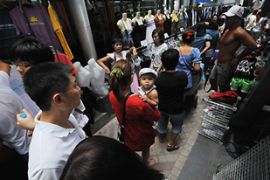Thai PM faces no-confidence motion
Opposition accuses government of using excessive force against red shirt protesters.

“What had happened was there was a militia group which attacked the military and that led to clashes,” said Abhisit.
“We will explain this fact and we show our sincerity by allowing an independent committee to investigate.”
Navi Pillay, the UN human rights chief, said an independent probe into the violence was necessary to “foster longer-term political reconciliation” in Thailand.
“I urge the government to ensure that an independent investigation of recent events be conducted and all those found responsible for human rights violations are held to account,” Pillay told a meeting of the human rights council on Monday.
Reacting to Pillay’s call, Sihasak Phuangketkeow, the Thai ambassador to the UN,
said “the Thai government is open to scrutiny and is ready to be subject to legal process in accordance with the law,” adding that the army had acted in line with international standards.
Opposition charge
The opposition has also accused Abhisit and five cabinet ministers of corruption and economic mismanagement.
| in depth | |||||||||||||||||||||||||||||||||||||||||
|
The no-confidence motion is led by the Puea Thai Party backed by ousted prime minister Thaksin Shinawatra.
Puea Thai, popular in rural north and northeastern provinces, is widely expected to win the most seats in the next election.
But Abhisit is expected to survive the motion during a vote on Wednesday with strong support from his six-party coalition.
“I’m here to ask for justice for the victims of the clashes. There has to be a proper investigation instead of the government blaming terrorists for everything,” Jatuporn Prompan, a red-shirt leader and Puea Thai legislator, told reporters before the debate.
Puea Thai speakers said excessive and illegal measures, such as night-time operations and the use of live ammunition, were used by troops in attempts to surround two protest sites and disperse demonstrators.
Al Jazeera’s Aela Callan, reporting from Bangkok, said the opposition is gunning in particular for the deputy prime minister for his controversial role.
The red shirts blame Suthep Thaugsuban for ordering an earlier crackdown – on April 10 – which left 29 people dead and hundreds injured.
Also likely to be closely scrutinised was what happened at the Pathum Vanaram temple where women and children had taken refuge before and during the final military crackdown, our correspondent said.
Six people were founded killed there in the aftermath of the crackdown.
Abhisit said there was no military action at the time of the temple shootings, but admitted that shots were fired after the military operation ended and has said the events will be investigated by an independent committee.
Evidence battle
The opposition and government both want to produce photographs, videos and documents related to the protests and bloodshed during the censure debate.
But amid allegations of doctoring of evidence, the opposition has boycotted a panel set up to review footage of the violence, casting doubt on whether they would be allowed to show their own evidence in parliament.
“If we can’t show clips then after the debate we will show them on stages in different provinces that are not under a state of emergency,” Prompong Nopparit, a spokesman for the Puea Thai party, said over the weekend.
The government lifted a night-time curfew on Saturday, saying the situation was returning to normal, but it left in place emergency rule across more than one third of the country, including Bangkok.
